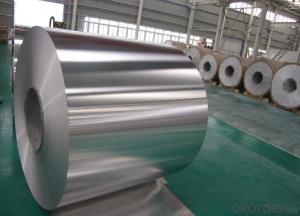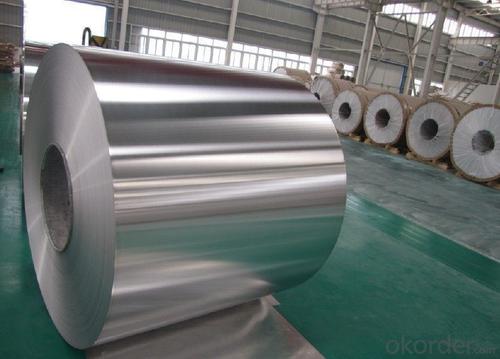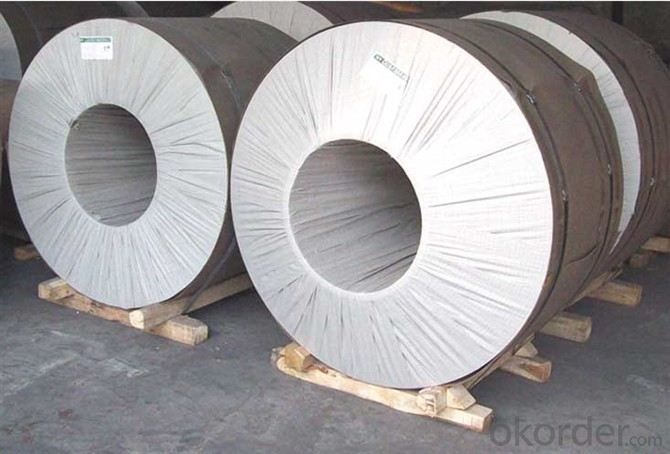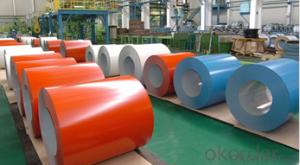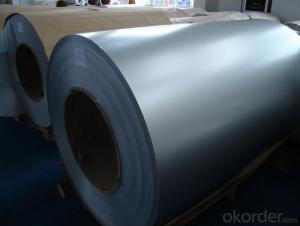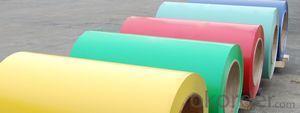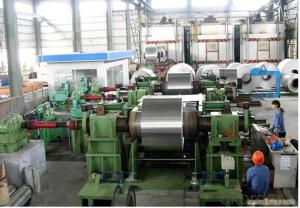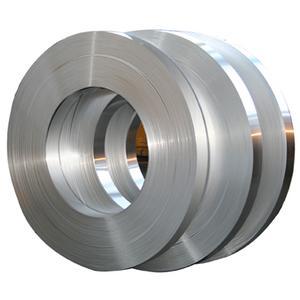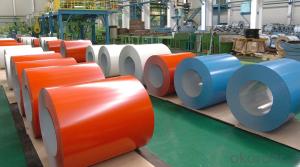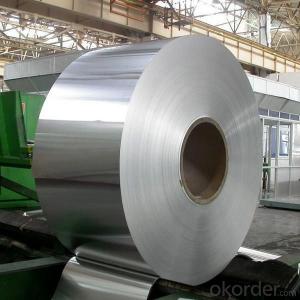High Quality 1070 Alloy Coil Aluminum
- Loading Port:
- Shanghai
- Payment Terms:
- TT OR LC
- Min Order Qty:
- 5 m.t.
- Supply Capability:
- 10000 m.t./month
OKorder Service Pledge
OKorder Financial Service
You Might Also Like
Specification
1. Specification of 1070 Alloy Aluminum Coil with High Quality
Material | Alloy Aluminum 6063,6061,6005 or customer nominated |
Temper | T3, T4, T5, T6 |
Surface | Anodize, electrophoresis, powder coating, PVDF coating, wood grain painting, matted, etc. |
Colour | Any colour based on Standard Germany RAL Mark |
Length | Coating 6.5 meters, Anodizing 6.5 meters, Mill finish 5 meters |
Press Machine | 500-4000 tons all together 64 press lines. |
Fabrication | 1. Windows and doors; 2. Drilling; 3. Bending; 4. Cutting; 5. etc. |
Certificate | ISO 9001 |
Moulding | 1. Using our moulds, no fee; |
2. Using customer drawing, opening mould, usually about 10~50 tons then the moulding can be refunded. | |
3. Mould cost is negotiable base on the order quantity | |
Capability | Annual output 100,000 tons |
2. Application of 1070 Alloy Aluminum Coil with High Quality
(1).Interior: wall cladding, ceilings, bathrooms, kitchens and balconies, shutters, doors...
(2).Exterior: wall cladding, facades, roofing, canopies, tunnels,column covers , renovations...
(3).Advertisement: display platforms, signboards, fascia, shop fronts...
3. Feature of 1070 Alloy Aluminum Coil with High Quality
*Such coil is specially designed to replace aluminum ingot, due to the high export tax of aluminum ingot, the coil has better price than ingot.
*This type of coil can fit customer's remelting furnace just like ingot, no need to make any change to the production line that was previously used for ingot. The standard coil size and weight is very suitable for the feed gate of furnace.
*This type of coil causes less material wastage than ingot when remelted.
*Our coil is made directly from ore, no need to go though the ingot making process, quality is much better than other suppliers who use ingot scrap to make coil.
Be free from Oil Stain, Dent, Inclusion, Scratches, Stain, Oxide Dicoloration, Breaks, Corrosion, Roll Marks, Dirt Streaks and other defect which will interfere with use
4. Certificate:
SGS and ROHS(if client request, paid by client), MTC(plant provided), Certificate of Origin(FORM A, FORM E, CO), Bureau Veritas and SGS (if client request, paid by client), CIQS certificate
5. Image of 1070 Alloy Aluminum Coil with High Quality
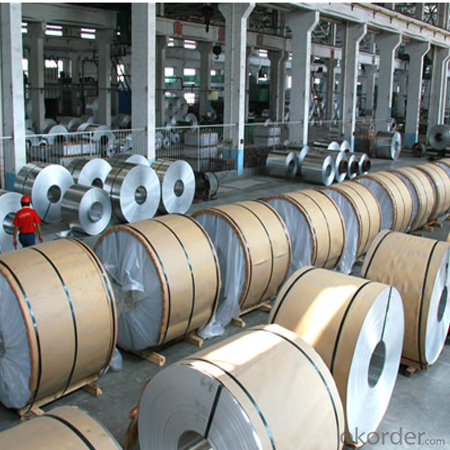
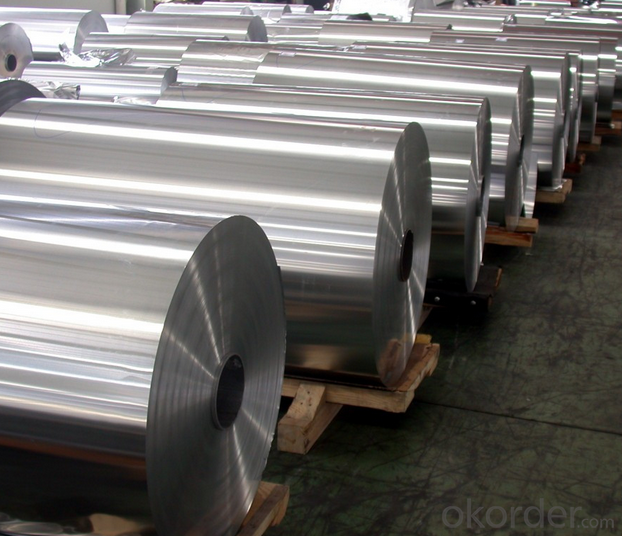
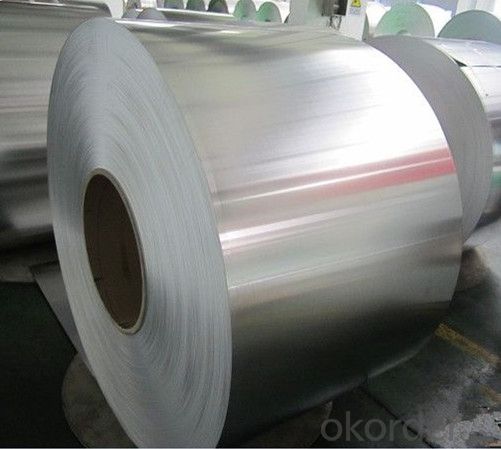
6. Package and shipping of 1070 Alloy Aluminum Coil with High Quality
eye to wall
eye to the wall
with wood pallet (wooded case also available)
7. FAQ
1) What is the delivery time?
Dpends on actual order, around 20 to 35 days
2)What is the QC system:
We have QC staff of 20 persons and advanced equipment, each production is with MTC traced from Aluminum ingot lot.
3) What market do you mainly sell to?
Australia, America, Asia, Middle East, Western Europe, Africa etc
- Q: Can aluminum coils be used for aerospace applications?
- Yes, aluminum coils can be used for aerospace applications. Aluminum is a commonly used material in the aerospace industry due to its unique combination of lightweight, strength, and corrosion resistance properties. Aluminum coils are used to manufacture various components and structures in aerospace applications, such as aircraft frames, wings, fuselages, and engine parts. The use of aluminum coils in aerospace applications helps to reduce the overall weight of the aircraft, which in turn improves fuel efficiency and enhances performance. Additionally, aluminum coils can be easily formed, welded, and machined, making them suitable for the complex shapes and structures required in aerospace engineering.
- Q: Are there any limitations to using aluminum coils?
- Yes, there are certain limitations to using aluminum coils. One limitation is that aluminum has a lower tensile strength compared to other metals like steel, making it more prone to damage or deformation under heavy loads or impacts. Additionally, aluminum coils can be susceptible to corrosion if not properly protected or coated. Finally, aluminum coils may not be suitable for applications that require high electrical conductivity, as aluminum has a lower conductivity compared to copper.
- Q: Is it possible to utilize an angle grinder for cutting hot rolled aluminum coils?
- <p>Yes, you can use an angle grinder to cut hot rolled aluminum coils, but you must take precautions. Use a grinding disc specifically designed for metal cutting, preferably one with a diamond or carbide grit for better performance on aluminum. Ensure the grinder is equipped with a safety guard and wear appropriate safety gear, including goggles and gloves. Be aware that aluminum can be reactive when heated, so cutting may produce sparks and fumes; ensure proper ventilation. Always follow the manufacturer's guidelines for your specific angle grinder and safety regulations.</p>
- Q: What are the different coil pattern options for aluminum coils?
- The different coil pattern options for aluminum coils include flat, stucco, diamond, and tread patterns.
- Q: Are there any restrictions on the coil thickness of aluminum coils?
- Yes, there are typically restrictions on the coil thickness of aluminum coils. The specific restrictions may vary depending on the intended application and industry standards. Generally, the thickness of aluminum coils is limited by the capabilities of the manufacturing equipment and the desired final product. Thinner coils are often preferred for applications that require flexibility, such as in the manufacturing of foils or flexible packaging materials. On the other hand, thicker coils are commonly used in industries like construction or automotive, where strength and durability are important factors. Additionally, the thickness of aluminum coils may be restricted by the availability and cost of raw materials. It is important for manufacturers to adhere to these restrictions to ensure the quality and performance of the final product.
- Q: Some makes like KIA make a point of having aluminum engines. I thought this was for weight, but was more prone to failure, especially in a high mileage car.
- depends. i had a 79 F150, obviously engine made of steel. I let the water run out, the oil run out, the tranny fluid run out, etc. Couldnt kill that truck. I think the aluminum engines built today are fine, depending on the manufacturer. You cant run these engines into the ground though. I have had hondas and toyotas that ran forever with aluminum engines. Chrysler (dodge and plymouth) aluminum engines i have found are junk. I have been told by people who know to never buy a kia. if you can't afford a new car, buy a used one, like toyota, honda, never a nissan though. engines are just as good but the rest of the car is made out of pot metal. mazda is my favorite and many a ford has mazda engineering inside. the ford escape 4 cylinder is what i drive. it has a mazda engine.
- Q: How do aluminum coils compare to other metal coils like steel or copper?
- Aluminum coils offer several advantages and disadvantages when compared to other metal coils like steel or copper. In terms of weight, aluminum coils are significantly lighter than steel coils. This makes them easier to handle and transport, which can reduce costs in the manufacturing and construction industries. On the other hand, steel coils are much stronger and more durable than aluminum, making them more suitable for heavy-duty applications where strength is crucial. In terms of corrosion resistance, aluminum coils have a natural oxide layer that protects them from rust and corrosion. This makes them an excellent choice for outdoor applications or environments with high humidity. Copper coils also have excellent corrosion resistance, but steel coils are more prone to rust and require additional protective coatings. Thermal conductivity is another factor to consider. Copper is known for its exceptional thermal conductivity, making it highly efficient for applications that require heat transfer, such as HVAC systems. Aluminum coils have lower thermal conductivity than copper, but they are still widely used in various heat transfer applications due to their lightweight and cost-effectiveness. Cost is a significant consideration when comparing different metal coils. Aluminum coils are generally more affordable than copper and steel coils, which makes them a popular choice for many industries. However, steel coils are often the most cost-effective option for heavy-duty applications due to their strength and durability. Overall, the choice between aluminum, steel, or copper coils depends on the specific requirements of the application. Each metal has its own unique properties and advantages, and selecting the right material involves considering factors such as weight, strength, corrosion resistance, thermal conductivity, and cost.
- Q: What are the different available coil weights for aluminum coils?
- The different available coil weights for aluminum coils can vary depending on the specific manufacturer and application requirements. However, common coil weights for aluminum coils range from a few hundred pounds to several thousand pounds.
- Q: Can aluminum coils be used in the production of aluminum cladding?
- Yes, aluminum coils can be used in the production of aluminum cladding.
- Q: What are the common fabrication techniques used for aluminum coils?
- Aluminum coils undergo various fabrication techniques to achieve desired properties. Rolling, annealing, slitting, and coating are commonly employed. Rolling, a primary technique, reduces thickness and shapes aluminum by passing it through rollers. Hot rolling, with high temperatures, makes the metal more malleable, while cold rolling is done at room temperature. Annealing, another important technique, enhances mechanical properties by heating and slowly cooling the aluminum. It relieves stresses, improves formability, and strengthens the metal. Slitting cuts wide coils into narrower strips, providing customization options. Specialized machines are used for precise width adjustments. Coating, a common technique, improves durability, corrosion resistance, and appearance. Paint, anodizing, or powder coating methods create protective layers, preventing oxidation and enhancing weather resistance and aesthetics. These techniques are widely used in the aluminum industry, producing high-quality coils for construction, automotive, aerospace, electrical, and other industries.
Send your message to us
High Quality 1070 Alloy Coil Aluminum
- Loading Port:
- Shanghai
- Payment Terms:
- TT OR LC
- Min Order Qty:
- 5 m.t.
- Supply Capability:
- 10000 m.t./month
OKorder Service Pledge
OKorder Financial Service
Similar products
Hot products
Hot Searches
Related keywords
